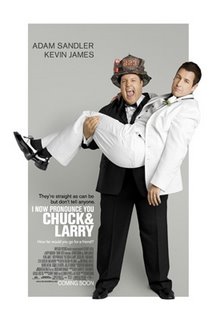
So, I'm sitting here, trying to collect my thoughts on
I Now Pronounce You Chuck and Larry. And the one thought that keeps on entering my head is how did such talented people get involved in this mess? Say what you will about Adam Sandler, I've always found him likeable, and have often defended some of his dumbest films such as
Happy Gilmore and
Little Nicky. And two of the writers credited to the screenplay are Alexander Payne and Jim Taylor, who together have written such wonderful films such as
Election,
About Schmidt, and
Sideways. So what are they, and many other talented people, doing in this movie that sloppily tries to combine crude gay and racial stereotypes with "hit you over the head"-level sentiment? My only guess is some pretty good pay checks were handed out.
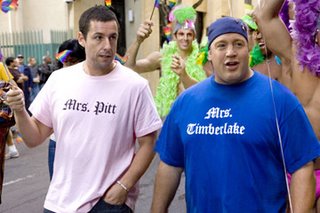
New York firefighters and best friends, Chuck Levine (Adam Sandler) and Larry Valentine (Kevin James), are as different as can be. Chuck is a chauvinistic ladies man who often finds himself spending the night with six different women in the same bed. Larry is a struggling single dad who has been trying to raise his two young children on his own since the passing of his wife. When Larry finds out he can't list his kids as sole beneficiaries of his life insurance plan without a spouse or life partner, he finds himself driven to extremes, worried that his kids will have nothing if something should happen to him on the job. This drives him to concoct a scheme where Chuck and him will pose as a gay couple, so that Larry can continue with his pension plan. What starts as a simple lie on paper quickly grows into something bigger when the government gets involved. They're cracking down on people creating fake relationships in order to collect on insurance, and have even sent the slimy inspector Clinton Fitzer (Steve Buscemi) to snoop around and find out if they are a legitimate gay couple. The two friends are forced to legally marry each other, and present themselves as a couple in front of their friends and co-workers, who start treating them differently when the two "come out". It's especially hard for Chuck, who is forced to give up the many women in his life, and must hold back his urges for the lovely young lawyer, Alex McDonough (Jessica Biel), who is defending them when the State gets involved.
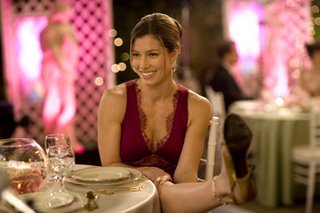
With an honest and subtle approach, I could certainly picture the premise of
I Now Pronounce You Chuck and Larry working in a quirky sort of way. However, long-time Sandler filmmaker, Dennis Dugan (
Benchwarmers,
Big Daddy), aims for broad stereotypes and juvenile humor. This is a movie that doesn't seem to be sure if it wants to make fun of gay people, or support them. Outside of the two lead characters, who are only posing as being gay to begin with, every gay character to walk onto the screen is an overly broad cartoon caricature that don't have the slightest bit of sincerity or subtlety. They're portrayed as cartoonish buffoons, or overly flamboyant to the point of self-parody. This being an Adam Sandler comedy, I wasn't exactly expecting anything exactly engaging or thought-provoking in its characterizations. But, I was still taken aback by the way this movie handles most of its characters. Take one of Larry's two children. He's a young boy who looks to be about 10 or so. He's worried about his son, because he likes to play with Easy Bake Ovens, tap dance, and sing show tunes. Absolutely nothing is done with this character or this idea. When Larry is forced to pretend that he is gay, this does not seem to open his eyes to his son. It's just a throwaway subplot that asks us to laugh at the kid, simply because he shows cliched homosexual tendencies. A good screenplay would have built upon this idea, instead of just tossing it to the wayside and moving on. I haven't even mentioned the most offensive character in the film, who is a gay Japanese man who performs the wedding ceremony for Chuck and Larry. He's played by Sandler's long-time co-star, Rob Schneider, for reasons that completely mystify me. Were there no Asian actors available that could have spared us the sight of Mr. Schneider doing a horrible imitation of one that comes across as an offensive stereotype from a 1960s comedy? My guess is the filmmakers thought it'd be funny to have him playing an Asian. They were wrong.
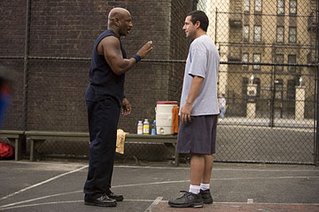
Outside of the broad and offensive stereotypes that populate this film, the humor is quite frequently forced and lame. The characters talk like people in a bad sitcom, not like actual people. In one scene, Larry is attending a "Career Day" at his kid's school. By this point of the film, the lie about them being gay is out in the open. Apparently, the entire world now knows about it, because one of the kids in the classrooms asks if he has two jobs - one as a firefighter, and the other as a butt-pirate. (ho ho) The movie goes from bad to worse when it stops trying to make fun of gay people, and actually tries to stick up for them. Near the end of the movie, we get a series of lengthy scenes where different members of the cast preach to extras and us in the audience that homophobia is bad, and that gay people have rights. It's not that I don't agree with the message the film wants to leave with us, it's just that it is applied with all the subtlety of lighting a dog on fire. Adam Sandler even gets to stand up in the middle of a courtroom, and give a "stirring" speech that I think was supposed to have me nodding my head in agreement, but only had me shaking my head in embarrassment. The sudden shift in tone from crude stereotype comedy to "gays are people too" message film is so messy and awkward I almost couldn't believe my eyes. Did no one stop and think that a movie that previously featured gays as cartoonish stereotypes should not end with its main characters in a courtroom, telling us we should respect them? If you're trying to be offensive, at least have the guts to go all the way, and don't apologize for yourself with a preachy third act.
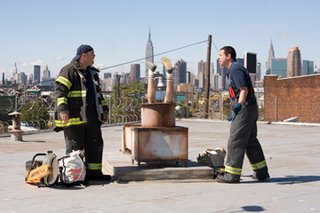
Casting is one of the more important aspects of a movie, as it helps us identify with the characters. Who exactly thought Adam Sandler would be able to pull off coming across as a ladies man who has supermodels literally banging down his door? I'm not trying to say that Sandler does not have a certain charm to his appearance, but trying to picture him as a calendar model is kind of like trying to picture Michael Jackson as a heavyweight championship boxer. As for his performance, he's not terrible, but he never seems to have any real chemistry with Kevin James, which ultimately sinks both of their performances. We never believe that these two are friends, much less lovers. Oddly enough, the film spends very little time on Chuck and Larry's fake relationship, and concerns itself more with the relationship that builds between Chuck and their lawyer. Maybe it's because the movie seems to understand that Sandler has a much easier and sweeter chemistry with Jessica Biel, who is a much more winning co-star for him than Kevin James to begin with. In supporting roles, Dan Aykroyd shows up as the chief of the fire station where the guys work. He seems happy to be in the movie, but isn't given anything to do. Steve Buscemi can be a funny actor and is usually always fun to watch, but he's given no material to work with. The movie does a good job at making us hate his character, but supplies no reason for us to be interested in him.
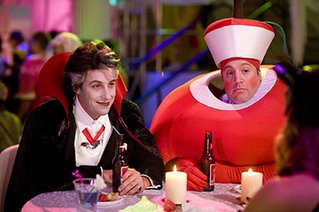 I Now Pronounce You Chuck and Larry
I Now Pronounce You Chuck and Larry is not beyond help. There are some scattered laughs here and there, and the soundtrack that features a lot of popular music from the 70s and 80s is lively and energetic, often much more so than the scene they're accompanying. This is not likely to join some of Sandler's past unsalvageable disasters, such as his animated
Eight Crazy Nights, or his wrong-headed attempt at remaking
The Longest Yard. Still, everyone involved deserved better than the material they've been given. This is a movie where you get the sense that although everyone was having fun making this movie, they still wound up giving more effort than they should have.
1 comments
 So, I'm sitting here, trying to collect my thoughts on I Now Pronounce You Chuck and Larry. And the one thought that keeps on entering my head is how did such talented people get involved in this mess? Say what you will about Adam Sandler, I've always found him likeable, and have often defended some of his dumbest films such as Happy Gilmore and Little Nicky. And two of the writers credited to the screenplay are Alexander Payne and Jim Taylor, who together have written such wonderful films such as Election, About Schmidt, and Sideways. So what are they, and many other talented people, doing in this movie that sloppily tries to combine crude gay and racial stereotypes with "hit you over the head"-level sentiment? My only guess is some pretty good pay checks were handed out.
So, I'm sitting here, trying to collect my thoughts on I Now Pronounce You Chuck and Larry. And the one thought that keeps on entering my head is how did such talented people get involved in this mess? Say what you will about Adam Sandler, I've always found him likeable, and have often defended some of his dumbest films such as Happy Gilmore and Little Nicky. And two of the writers credited to the screenplay are Alexander Payne and Jim Taylor, who together have written such wonderful films such as Election, About Schmidt, and Sideways. So what are they, and many other talented people, doing in this movie that sloppily tries to combine crude gay and racial stereotypes with "hit you over the head"-level sentiment? My only guess is some pretty good pay checks were handed out. New York firefighters and best friends, Chuck Levine (Adam Sandler) and Larry Valentine (Kevin James), are as different as can be. Chuck is a chauvinistic ladies man who often finds himself spending the night with six different women in the same bed. Larry is a struggling single dad who has been trying to raise his two young children on his own since the passing of his wife. When Larry finds out he can't list his kids as sole beneficiaries of his life insurance plan without a spouse or life partner, he finds himself driven to extremes, worried that his kids will have nothing if something should happen to him on the job. This drives him to concoct a scheme where Chuck and him will pose as a gay couple, so that Larry can continue with his pension plan. What starts as a simple lie on paper quickly grows into something bigger when the government gets involved. They're cracking down on people creating fake relationships in order to collect on insurance, and have even sent the slimy inspector Clinton Fitzer (Steve Buscemi) to snoop around and find out if they are a legitimate gay couple. The two friends are forced to legally marry each other, and present themselves as a couple in front of their friends and co-workers, who start treating them differently when the two "come out". It's especially hard for Chuck, who is forced to give up the many women in his life, and must hold back his urges for the lovely young lawyer, Alex McDonough (Jessica Biel), who is defending them when the State gets involved.
New York firefighters and best friends, Chuck Levine (Adam Sandler) and Larry Valentine (Kevin James), are as different as can be. Chuck is a chauvinistic ladies man who often finds himself spending the night with six different women in the same bed. Larry is a struggling single dad who has been trying to raise his two young children on his own since the passing of his wife. When Larry finds out he can't list his kids as sole beneficiaries of his life insurance plan without a spouse or life partner, he finds himself driven to extremes, worried that his kids will have nothing if something should happen to him on the job. This drives him to concoct a scheme where Chuck and him will pose as a gay couple, so that Larry can continue with his pension plan. What starts as a simple lie on paper quickly grows into something bigger when the government gets involved. They're cracking down on people creating fake relationships in order to collect on insurance, and have even sent the slimy inspector Clinton Fitzer (Steve Buscemi) to snoop around and find out if they are a legitimate gay couple. The two friends are forced to legally marry each other, and present themselves as a couple in front of their friends and co-workers, who start treating them differently when the two "come out". It's especially hard for Chuck, who is forced to give up the many women in his life, and must hold back his urges for the lovely young lawyer, Alex McDonough (Jessica Biel), who is defending them when the State gets involved. With an honest and subtle approach, I could certainly picture the premise of I Now Pronounce You Chuck and Larry working in a quirky sort of way. However, long-time Sandler filmmaker, Dennis Dugan (Benchwarmers, Big Daddy), aims for broad stereotypes and juvenile humor. This is a movie that doesn't seem to be sure if it wants to make fun of gay people, or support them. Outside of the two lead characters, who are only posing as being gay to begin with, every gay character to walk onto the screen is an overly broad cartoon caricature that don't have the slightest bit of sincerity or subtlety. They're portrayed as cartoonish buffoons, or overly flamboyant to the point of self-parody. This being an Adam Sandler comedy, I wasn't exactly expecting anything exactly engaging or thought-provoking in its characterizations. But, I was still taken aback by the way this movie handles most of its characters. Take one of Larry's two children. He's a young boy who looks to be about 10 or so. He's worried about his son, because he likes to play with Easy Bake Ovens, tap dance, and sing show tunes. Absolutely nothing is done with this character or this idea. When Larry is forced to pretend that he is gay, this does not seem to open his eyes to his son. It's just a throwaway subplot that asks us to laugh at the kid, simply because he shows cliched homosexual tendencies. A good screenplay would have built upon this idea, instead of just tossing it to the wayside and moving on. I haven't even mentioned the most offensive character in the film, who is a gay Japanese man who performs the wedding ceremony for Chuck and Larry. He's played by Sandler's long-time co-star, Rob Schneider, for reasons that completely mystify me. Were there no Asian actors available that could have spared us the sight of Mr. Schneider doing a horrible imitation of one that comes across as an offensive stereotype from a 1960s comedy? My guess is the filmmakers thought it'd be funny to have him playing an Asian. They were wrong.
With an honest and subtle approach, I could certainly picture the premise of I Now Pronounce You Chuck and Larry working in a quirky sort of way. However, long-time Sandler filmmaker, Dennis Dugan (Benchwarmers, Big Daddy), aims for broad stereotypes and juvenile humor. This is a movie that doesn't seem to be sure if it wants to make fun of gay people, or support them. Outside of the two lead characters, who are only posing as being gay to begin with, every gay character to walk onto the screen is an overly broad cartoon caricature that don't have the slightest bit of sincerity or subtlety. They're portrayed as cartoonish buffoons, or overly flamboyant to the point of self-parody. This being an Adam Sandler comedy, I wasn't exactly expecting anything exactly engaging or thought-provoking in its characterizations. But, I was still taken aback by the way this movie handles most of its characters. Take one of Larry's two children. He's a young boy who looks to be about 10 or so. He's worried about his son, because he likes to play with Easy Bake Ovens, tap dance, and sing show tunes. Absolutely nothing is done with this character or this idea. When Larry is forced to pretend that he is gay, this does not seem to open his eyes to his son. It's just a throwaway subplot that asks us to laugh at the kid, simply because he shows cliched homosexual tendencies. A good screenplay would have built upon this idea, instead of just tossing it to the wayside and moving on. I haven't even mentioned the most offensive character in the film, who is a gay Japanese man who performs the wedding ceremony for Chuck and Larry. He's played by Sandler's long-time co-star, Rob Schneider, for reasons that completely mystify me. Were there no Asian actors available that could have spared us the sight of Mr. Schneider doing a horrible imitation of one that comes across as an offensive stereotype from a 1960s comedy? My guess is the filmmakers thought it'd be funny to have him playing an Asian. They were wrong. Outside of the broad and offensive stereotypes that populate this film, the humor is quite frequently forced and lame. The characters talk like people in a bad sitcom, not like actual people. In one scene, Larry is attending a "Career Day" at his kid's school. By this point of the film, the lie about them being gay is out in the open. Apparently, the entire world now knows about it, because one of the kids in the classrooms asks if he has two jobs - one as a firefighter, and the other as a butt-pirate. (ho ho) The movie goes from bad to worse when it stops trying to make fun of gay people, and actually tries to stick up for them. Near the end of the movie, we get a series of lengthy scenes where different members of the cast preach to extras and us in the audience that homophobia is bad, and that gay people have rights. It's not that I don't agree with the message the film wants to leave with us, it's just that it is applied with all the subtlety of lighting a dog on fire. Adam Sandler even gets to stand up in the middle of a courtroom, and give a "stirring" speech that I think was supposed to have me nodding my head in agreement, but only had me shaking my head in embarrassment. The sudden shift in tone from crude stereotype comedy to "gays are people too" message film is so messy and awkward I almost couldn't believe my eyes. Did no one stop and think that a movie that previously featured gays as cartoonish stereotypes should not end with its main characters in a courtroom, telling us we should respect them? If you're trying to be offensive, at least have the guts to go all the way, and don't apologize for yourself with a preachy third act.
Outside of the broad and offensive stereotypes that populate this film, the humor is quite frequently forced and lame. The characters talk like people in a bad sitcom, not like actual people. In one scene, Larry is attending a "Career Day" at his kid's school. By this point of the film, the lie about them being gay is out in the open. Apparently, the entire world now knows about it, because one of the kids in the classrooms asks if he has two jobs - one as a firefighter, and the other as a butt-pirate. (ho ho) The movie goes from bad to worse when it stops trying to make fun of gay people, and actually tries to stick up for them. Near the end of the movie, we get a series of lengthy scenes where different members of the cast preach to extras and us in the audience that homophobia is bad, and that gay people have rights. It's not that I don't agree with the message the film wants to leave with us, it's just that it is applied with all the subtlety of lighting a dog on fire. Adam Sandler even gets to stand up in the middle of a courtroom, and give a "stirring" speech that I think was supposed to have me nodding my head in agreement, but only had me shaking my head in embarrassment. The sudden shift in tone from crude stereotype comedy to "gays are people too" message film is so messy and awkward I almost couldn't believe my eyes. Did no one stop and think that a movie that previously featured gays as cartoonish stereotypes should not end with its main characters in a courtroom, telling us we should respect them? If you're trying to be offensive, at least have the guts to go all the way, and don't apologize for yourself with a preachy third act. Casting is one of the more important aspects of a movie, as it helps us identify with the characters. Who exactly thought Adam Sandler would be able to pull off coming across as a ladies man who has supermodels literally banging down his door? I'm not trying to say that Sandler does not have a certain charm to his appearance, but trying to picture him as a calendar model is kind of like trying to picture Michael Jackson as a heavyweight championship boxer. As for his performance, he's not terrible, but he never seems to have any real chemistry with Kevin James, which ultimately sinks both of their performances. We never believe that these two are friends, much less lovers. Oddly enough, the film spends very little time on Chuck and Larry's fake relationship, and concerns itself more with the relationship that builds between Chuck and their lawyer. Maybe it's because the movie seems to understand that Sandler has a much easier and sweeter chemistry with Jessica Biel, who is a much more winning co-star for him than Kevin James to begin with. In supporting roles, Dan Aykroyd shows up as the chief of the fire station where the guys work. He seems happy to be in the movie, but isn't given anything to do. Steve Buscemi can be a funny actor and is usually always fun to watch, but he's given no material to work with. The movie does a good job at making us hate his character, but supplies no reason for us to be interested in him.
Casting is one of the more important aspects of a movie, as it helps us identify with the characters. Who exactly thought Adam Sandler would be able to pull off coming across as a ladies man who has supermodels literally banging down his door? I'm not trying to say that Sandler does not have a certain charm to his appearance, but trying to picture him as a calendar model is kind of like trying to picture Michael Jackson as a heavyweight championship boxer. As for his performance, he's not terrible, but he never seems to have any real chemistry with Kevin James, which ultimately sinks both of their performances. We never believe that these two are friends, much less lovers. Oddly enough, the film spends very little time on Chuck and Larry's fake relationship, and concerns itself more with the relationship that builds between Chuck and their lawyer. Maybe it's because the movie seems to understand that Sandler has a much easier and sweeter chemistry with Jessica Biel, who is a much more winning co-star for him than Kevin James to begin with. In supporting roles, Dan Aykroyd shows up as the chief of the fire station where the guys work. He seems happy to be in the movie, but isn't given anything to do. Steve Buscemi can be a funny actor and is usually always fun to watch, but he's given no material to work with. The movie does a good job at making us hate his character, but supplies no reason for us to be interested in him. I Now Pronounce You Chuck and Larry is not beyond help. There are some scattered laughs here and there, and the soundtrack that features a lot of popular music from the 70s and 80s is lively and energetic, often much more so than the scene they're accompanying. This is not likely to join some of Sandler's past unsalvageable disasters, such as his animated Eight Crazy Nights, or his wrong-headed attempt at remaking The Longest Yard. Still, everyone involved deserved better than the material they've been given. This is a movie where you get the sense that although everyone was having fun making this movie, they still wound up giving more effort than they should have.
I Now Pronounce You Chuck and Larry is not beyond help. There are some scattered laughs here and there, and the soundtrack that features a lot of popular music from the 70s and 80s is lively and energetic, often much more so than the scene they're accompanying. This is not likely to join some of Sandler's past unsalvageable disasters, such as his animated Eight Crazy Nights, or his wrong-headed attempt at remaking The Longest Yard. Still, everyone involved deserved better than the material they've been given. This is a movie where you get the sense that although everyone was having fun making this movie, they still wound up giving more effort than they should have.






1 Comments:
Rob Schneider is half Asian, Filipino to be exact. Which makes it all the more perplexing and disturbing that he portrayed the worst Asian stereotype this side of Mickey Rooney in "Breakfast at Tiffany's."
By Unknown, at 8:02 PM
Unknown, at 8:02 PM
Post a Comment
<< Home